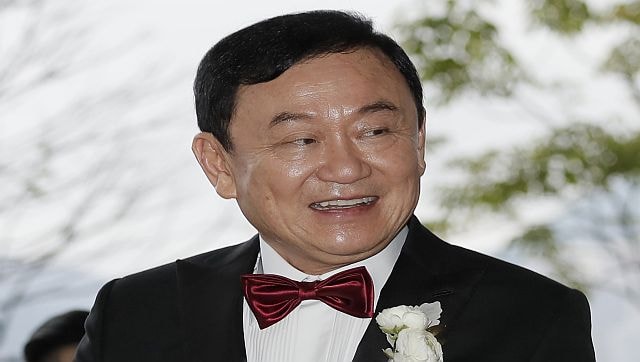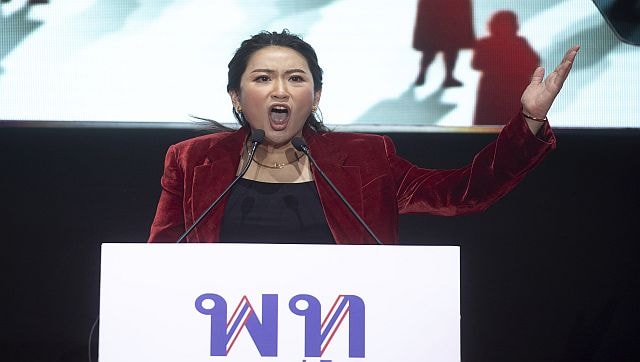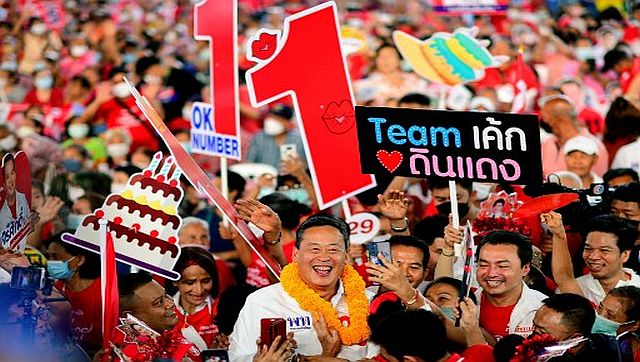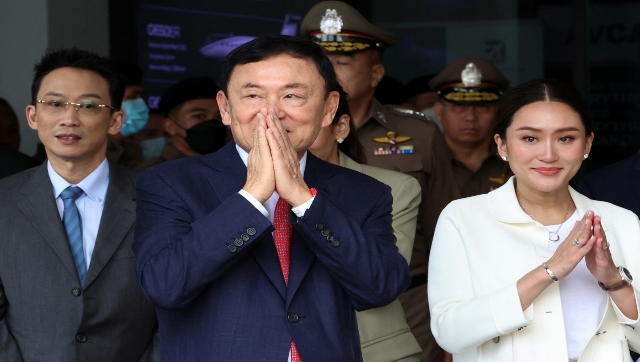Thaksin Shinawatra is back in Thailand. The former prime minister and controversial figure has returned to Thailand after years in exile. Thaksin, who has multiple outstanding criminal cases against him, was quickly arrested and sent to jail after his landing. But why is the 74-year-old billionaire and founder of the Thai Rak Thai party back? And what does his return mean for Thailand? Let’s take a closer look: Who is he? Early years Born into a family of ethnic Chinese silk merchants in 1949 in the northern city of Chiang Mai, Thaksin became a policeman in 1973 before pursuing graduate degrees in the United States. On his return, he established a computer dealership that he grew into Thailand’s largest mobile network, Shin Corporation, that laid the foundation for his rise to become one of the country’s richest men. [caption id=“attachment_12574952” align=“alignnone” width=“640”] Thaksin Shinawatra was prime minister between 2001 and 2006, while his sister Yingluck served as leader from 2011 until Prayut ousted her in a 2014 coup. AP[/caption] A shrewd operator who rarely minces his words, an increasingly wealthy Thaksin entered politics in the mid-1990s, initially serving as foreign minister and then deputy prime minister. In 1998, he founded the Thai Rak Thai (Thais Love Thais) that led him to power, starting off a premiership in 2001 during which he expanded spending on healthcare, rural development and farming subsidies, his “Thaksinomics”. Thaksin’s rivals accused him of winning power with handouts to rural voters, while critics accused him of abusing his electoral mandate to systematically dismantle constitutional checks and balances, while cementing his authoritarian rule.
Thaksin Shinawatra was prime minister between 2001 and 2006, while his sister Yingluck served as leader from 2011 until Prayut ousted her in a 2014 coup. AP[/caption] A shrewd operator who rarely minces his words, an increasingly wealthy Thaksin entered politics in the mid-1990s, initially serving as foreign minister and then deputy prime minister. In 1998, he founded the Thai Rak Thai (Thais Love Thais) that led him to power, starting off a premiership in 2001 during which he expanded spending on healthcare, rural development and farming subsidies, his “Thaksinomics”. Thaksin’s rivals accused him of winning power with handouts to rural voters, while critics accused him of abusing his electoral mandate to systematically dismantle constitutional checks and balances, while cementing his authoritarian rule.
Media watchdogs said he oversaw a steady erosion of press freedom.
A 2003 war on drugs in which 2,500 people were killed boosted his image as a crime-buster but sparked outrage from human rights groups, who said he was riding roughshod over civil liberties. The brash Thaksin, who called himself Thailand’s first “CEO prime minister”, also faced royalist accusations that he was undermining the revered monarchy, which he denied. Exile In 2005, Thaksin was easily re-elected to the post of prime minister. But an undercurrent of anger against him was already building. That rage exploded in 2006 when he sold his shares of Shin Corporation for 73.3 billion baht ($2.08 billion) to Singapore’s Temasek. His opponents complained of conflict of interest, alleging that the prime minister’s family did not pay tax on capital gains from the deal. The military leveraged middle class anger to stage a bloodless coup in September 2006 when Thaksin was abroad, but his loyalists kept winning general elections. Thitinan Pongsudhirak, a professor of political science and senior fellow at the Institute of Security and International Studies at Chulalongkorn University, told CNN:
“He became a threat because his popularity was competing against the establishment.”
But rather than fighting the corruption charges, which he claimed were politically motivated, Thaksin skipped bail and went into self-exile initially in Britain, where he bought Premier League club Manchester City. His critics called the purchase a political gimmick. He returned to Thailand in early 2008 to face the various legal charges filed against him but again went into self-exile months later. “If I am fortunate enough,” wrote Thaksin, a deeply polarising telecoms billionaire who broke the mould of Thai politics, “I will return and die on Thai soil.” A government led by his sister, Yingluck Shinawatra, swept to power in a 2011 election, only to be ousted in a 2014 coup by outgoing prime minister Prayut Chan-o-Cha after relentless street protests led by his conservative enemies. The return On Tuesday, Thaksin finally returned. Thaksin flew from Singapore in his private jet and landed at Don Mueang International Airport around 9 am local time. Thai broadcasters aired live footage of him walking out of the airport’s private jet terminal with his three children including his youngest daughter, key Pheu Thai member Paetongtarn Shinawatra. [caption id=“attachment_12592342” align=“alignnone” width=“640”] Pheu Thai Party’s Paetongtarn Shinawatra, youngest daughter of former Thai prime minister Thaksin Shinawatra. AP[/caption] His grandchildren were also seen. After walking out, Thaksin placed a flower wreath and prostrated before a portrait of Thailand’s king and queen at the gate of the terminal. He spent a moment greeting supporters and the media waiting in front of the terminal but did not speak. Hundreds of his supporters gathered outside of the airport hours ahead of his arrival, donning red and holding signs with welcoming messages. They showed their devotion to him with songs and chants, then raised raucous cheers when he appeared at the entrance. “I feel fulfilled that I travelled here today to pick him up. If possible I want to hug him. Everyone has tears, tears coming out of their eyes,” said Makawan Payakkae, a 43-year-old from Maha Sarakham province. “We’ve waited for him to return to the land. There’s the feeling that we got someone we love back home,” said 63-year-old Mayuraet Kodchompoo. Paetongtarn posted family photos with Thaksin in the middle on Facebook with a message thanking people who went to the airport to welcome her father, saying “me and my family are very grateful.” His convoy left the airport and was seen arriving at the Supreme Court about an hour after he emerged at the airport. Thaksin was convicted in absentia in several criminal cases that he said were politically motivated, and he could face prison time unless he receives a royal pardon.
Pheu Thai Party’s Paetongtarn Shinawatra, youngest daughter of former Thai prime minister Thaksin Shinawatra. AP[/caption] His grandchildren were also seen. After walking out, Thaksin placed a flower wreath and prostrated before a portrait of Thailand’s king and queen at the gate of the terminal. He spent a moment greeting supporters and the media waiting in front of the terminal but did not speak. Hundreds of his supporters gathered outside of the airport hours ahead of his arrival, donning red and holding signs with welcoming messages. They showed their devotion to him with songs and chants, then raised raucous cheers when he appeared at the entrance. “I feel fulfilled that I travelled here today to pick him up. If possible I want to hug him. Everyone has tears, tears coming out of their eyes,” said Makawan Payakkae, a 43-year-old from Maha Sarakham province. “We’ve waited for him to return to the land. There’s the feeling that we got someone we love back home,” said 63-year-old Mayuraet Kodchompoo. Paetongtarn posted family photos with Thaksin in the middle on Facebook with a message thanking people who went to the airport to welcome her father, saying “me and my family are very grateful.” His convoy left the airport and was seen arriving at the Supreme Court about an hour after he emerged at the airport. Thaksin was convicted in absentia in several criminal cases that he said were politically motivated, and he could face prison time unless he receives a royal pardon.
He now faces years in jail after convictions of graft and abuse of power.
With the convictions against him, Thaksin could face more than a decade in prison, though Deputy Prime Minister Wissanu Krea-ngam of the outgoing military-linked government said earlier that Thaksin is eligible to request a pardon and could receive special treatment because of his age. Napon said Thaksin’s decision to return now suggests that “he has received assurances that he will not have to serve a prison sentence in full.” To the rural masses, Thaksin is loved as the first leader to pay attention to the needs of millions living beyond Bangkok’s bright lights. “He has always helped making our lives better,” 63-year-old Ankana Nattakit told Al Jazeera. “No other prime minister has done nearly anything as much for us. He’s the prime minister of the grassroots people.” But to many in the urban middle class and the royalist elite, Thaksin was a crony capitalist who plundered the economy while in power from 2001 until he was ousted in a 2006 military coup and later led a protest movement that reduced parts of Bangkok to smouldering ruins in 2010. What does this mean for Thailand? “It closes a crucial chapter in Thailand’s politics,” Thitinan said of Thaksin’s return. “He has been such a dominant force over the past two decades.” “His opponents and enemies have done everything to (Thaksin), including overthrowing him in the military coup, not once but twice – in 2006 against him, in 2014 against his sister. They have dissolved his parties twice,” Thitinan told CNN. “We’ve gone through so much in Thailand.” But when one chapter closes, another one has seemingly begun. While Thaksin has said his decision to return has nothing to do with an expected vote in Parliament later in the day on a candidate from the Pheu Thai party for prime minister, many believe his arrival is connected to the party’s pursuit of power.
The move comes on the same day that the Pheu Thai has begun its plans to start forming a new government.
Pheu Thai is the latest in a string of parties affiliated with Thaksin. The military coup that ousted him triggered years of upheaval and division that pitted a mostly poor, rural majority in the north that supports Thaksin against royalists, the military and their urban backers. [caption id=“attachment_12574972” align=“alignnone” width=“640”] Thaksin Shinawatra announced he would like to return before his birthday in July, but the plan was repeatedly delayed, with he and Paetongtarn citing both post-election uncertainties and his health. AFP[/caption] Thaksin had thus far avoided returning over concerns he would not be treated fairly by the military-backed government and establishment that has long held a sharp animosity toward him. He has remained active in Thai politics, however, often making video calls to rallies of his supporters and parties backed by him. “Thaksin’s plans to return to Thailand were postponed after the election results were announced — this implies a strong connection between the election, formation of coalitions, and selection of the prime minister on one hand, and Thaksin’s personal agenda on the other,” said Napon Jatusripitak, a political science researcher and visiting fellow at Singapore’s ISEAS-Yusof Ishak Institute. “Thaksin has managed to make this election about himself personally, and the direction of a Pheu Thai-led coalition heavily depends on his personal whims.” In an interview with BBC Thai on Saturday, Thaksin said his return was planned before the date of the parliamentary vote was set, and that he was prepared to follow the Thai legal process. Less than a week before the May elections, Thaksin announced he would like to return before his birthday in July, but the plan was repeatedly delayed, with he and Paetongtarn citing both post-election uncertainties and his health. Pheu Thai takes leadership in new govt Pheu Thai came in second in the elections but took over leadership in forming a new government after the surprise winner, the progressive Move Forward Party, was repeatedly rejected by conservative senators appointed by a previous military government. According to SCMP, the Move Forward Party has stated that its agenda includes among other things amending the royal defamation law, rolling back the army’s powers, ending conscription and monopolies. Move Forward’s reform agenda appealed deeply to many Thais, particularly younger voters who were disenchanted by nearly a decade of military-backed rule, but was seen as a threat by the country’s conservative elites. Pheu Thai launched the bid to form the government after it assembled an 11-party coalition including two parties allied with its former military adversaries Palang Pracharath and United Thai Nation Party.
Thaksin Shinawatra announced he would like to return before his birthday in July, but the plan was repeatedly delayed, with he and Paetongtarn citing both post-election uncertainties and his health. AFP[/caption] Thaksin had thus far avoided returning over concerns he would not be treated fairly by the military-backed government and establishment that has long held a sharp animosity toward him. He has remained active in Thai politics, however, often making video calls to rallies of his supporters and parties backed by him. “Thaksin’s plans to return to Thailand were postponed after the election results were announced — this implies a strong connection between the election, formation of coalitions, and selection of the prime minister on one hand, and Thaksin’s personal agenda on the other,” said Napon Jatusripitak, a political science researcher and visiting fellow at Singapore’s ISEAS-Yusof Ishak Institute. “Thaksin has managed to make this election about himself personally, and the direction of a Pheu Thai-led coalition heavily depends on his personal whims.” In an interview with BBC Thai on Saturday, Thaksin said his return was planned before the date of the parliamentary vote was set, and that he was prepared to follow the Thai legal process. Less than a week before the May elections, Thaksin announced he would like to return before his birthday in July, but the plan was repeatedly delayed, with he and Paetongtarn citing both post-election uncertainties and his health. Pheu Thai takes leadership in new govt Pheu Thai came in second in the elections but took over leadership in forming a new government after the surprise winner, the progressive Move Forward Party, was repeatedly rejected by conservative senators appointed by a previous military government. According to SCMP, the Move Forward Party has stated that its agenda includes among other things amending the royal defamation law, rolling back the army’s powers, ending conscription and monopolies. Move Forward’s reform agenda appealed deeply to many Thais, particularly younger voters who were disenchanted by nearly a decade of military-backed rule, but was seen as a threat by the country’s conservative elites. Pheu Thai launched the bid to form the government after it assembled an 11-party coalition including two parties allied with its former military adversaries Palang Pracharath and United Thai Nation Party.
“This is now a window for Thaksin to make a deal because he no longer is the threat,” Thitinan added to CNN.
Impact Shorts
More Shorts“He’s 74 years old, his party lost the election for the first time … Move Forward is the real threat, and therefore Thaksin is making a move to come back.” But Thitinan said Thaksin might be living in the past. “To me, Thai politics has moved beyond Thaksin,” Thitinan added. “It’s no longer about Thaksin populism in Thailand – it’s about institutional reforms of the royalist establishment that the Move Forward Party is proposing.” “Pheu Thai has been a victim of the royalist establishment for two decades, and now they’re making a deal with them to keep Move Forward away and out,” Thitinan said. Fresh vote on PM After more than three months without a new government for Thailand, Parliament convened on Tuesday to attempt to choose a prime minister again. Pheu Thai’s candidate, former property developer Srettha Thavisin, was the only name nominated by his party leader Chonlanan Srikaew. House Speaker Wan Muhammad Noor Matha has allocated time for lawmakers to debate on the nomination before the vote takes place in the afternoon. Srettha did not run for office and the law does not require a prime ministerial candidate to be an elected lawmaker. Parliament also does not require him to be present at the vote. Pheu Thai has been heavily criticized by some of its supporters for backtracking on a pre-election pledge not to join hands with pro-military parties. Party officials have defended the decision by saying it was necessary to break the political deadlock and seek reconciliation after decades of deep political divisions. The Pheu Thai-led coalition holds 314 seats in the 500-member House of Representatives and needs some support from the non-elected Senate, appointed by a previous military government, to achieve a majority in the combined parliamentary vote. Both houses of Parliament vote together for the prime minister under the military-implemented constitution, in an arrangement designed to protect conservative military-backed rule. Senators, like the army, see themselves as guardians of traditional conservative royalist values. With inputs from agencies
)